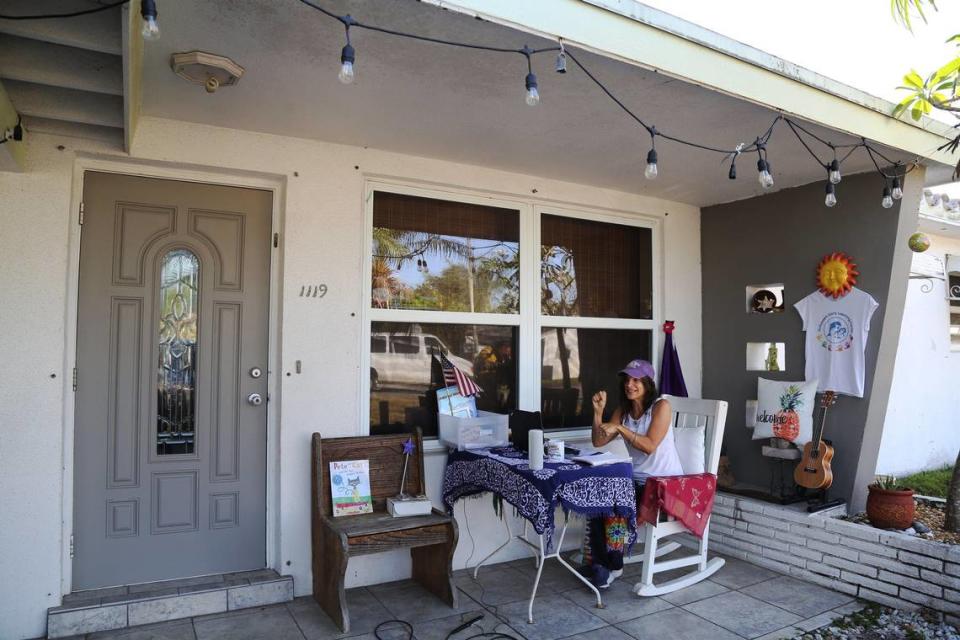Rocky start to Florida schools’ first official day of online learning during pandemic
Monday felt like the first day of a new school year for Sheryl Muñoz.
One by one, the veteran educator greeted her students with an excited hello as they pinged into her pre-K classroom — a virtual classroom, that is, broadcast from the front porch of her Hollywood home.
Just like they would at Gulfstream Early Learning Center, Muñoz’s class recited the “Pledge of Allegiance.” They went over the ground rules, like raising your hand to talk and being a good listener, all over a video chat.
Then it was Muñoz’s turn to listen. A young girl said she missed the beach, so she grabbed blue and brown blankets as surf and sand and played pretend. Some of her other 14 students showed off their art work from spring break.
“It’s gonna be the new norm. I’m very excited,” said Muñoz. “Everyone was smiling and had something to say, and everyone was engaged, which was amazing. It was good to see that everyone was OK.”
It is the new normal for her students and all students in Florida’s public schools during the coronavirus pandemic. Originally set to be using online distance learning until April 15, schools will likely stay online until at least May 1, according to recommended guidance released Monday from the Florida Department of Education. Miami-Dade Superintendent Alberto Carvalho announced late Monday that a “more realistic scenario would be that schools won’t reopen until sometime in May.”
Students across the state on Monday had rockier starts with online learning. Because these online learning platforms are used by schools across the nation, and are working to quickly build capacity, schools across Florida reported crashes and glitches while learning.
By 10 a.m., Broward County Public Schools sent out automated phone calls and district-wide emails notifying families of the platform outages. Students were asked to try logging on later.
“BCPS is experiencing internet slowness due to a sudden spike in users logging into Canvas and Clever,” a district email read. “We are actively working on the solution and will send another notice as soon as the problem is resolved.”
Still, teachers tried to make the best of an unprecedented situation. While Canvas is down, Muñoz said she’ll put her assignments on Class Dojo, another learning platform.

“We’re just going to have to vary our times. It’s just an overload for the system,” she said. “I’m sure they’ll work it out. It’s brand new for everybody.
“The teachers are working hard to make this a smooth transition because we genuinely care about our students,” Muñoz added. “We are the ones to make the bridge as stable and as smooth as we can.”
Broward Superintendent Robert Runcie tweeted that 160,000 students accessed online learning Monday. The school district has an enrollment of 270,000.
Some Broward County parents took the technical difficulties in stride. They appeared grateful for strong communication with their child’s teachers and school.
“Very few people like change and as the technology kinks are worked out, I have seen the administration and the teachers at my child’s school, Tropical Elementary, come together in an extremely professional and diligent way,” wrote parent Kelly Brandenburg in an email. “This change in how our students learn is not the disaster that many make it out to be. Parents are teaching their children how to adapt to change, how to improvise a solution and how to overcome the problem even when the solutions are working. This is also learning, albeit untraditional.”
Angie Gallo, an Orange County School Board member and vice president of educational development for the Florida Parent Teacher Association, said she heard from teachers in her district that they were also having issues with Canvas.
“It goes to reason that it has to be across the state,” she said.
Listen to today's top stories from the Miami Herald:

Miami-Dade answering questions
Virtual learning was more familiar for students in Miami-Dade County Public Schools, which got a head start in online learning the week before spring break.
Yet many questions were still left unanswered hours before Monday’s statewide official start of online distance learning. The district sent out an email answering some of these questions, including how grading and attendance would work, to all teachers at 11:35 p.m. Sunday.
It appeared those rules would not go into effect until next Monday, a week after the start of the fourth quarter. The district explained that this was part of the “second phase” of the instructional continuity plan, though it’s not clear why it was starting next week.
Beginning April 6, students must log into the student portal to be counted as present. If a student fails to do so, it will trigger an automated phone call to their parent or guardian notifying them that their child was marked absent. Starting that day, students will also get a minimum of one grade per week per subject.
Students are not expected to work on assignments for an entire school day. According to the email, student classroom and homework “are essentially one and the same.”
There appeared to be no large-scale issues with online learning in Miami-Dade. Similar to Broward, students in Miami-Dade said platforms worked in fits and starts. A school district spokeswoman characterized the crashes as “external issues” that are “sporadic in nature.”
Claire Kovacs, a 47-year-old nurse from North Miami, has a seventh-grader at Mater Academy in Miami Beach and an 11th-grader at Dr. Michael M. Krop Senior High. She said her younger son has had live, online instruction from 8:30 a.m. to 1:30 p.m. while her older son, who needs special accommodations, is easily sidetracked by all the work.
She said her older son has had trouble with his Khan Academy login, and teachers have been trying to work through it.
“I think they’re trying to grade the work that they’re getting and they’re not really IT specialists, either,” Kovacs said.
Second-grade teacher Kim Ottaviani broadcast her Zoom video session live from the floor of her living room in Hollywood. Fourteen of her 24 students from Bob Graham Educational Center logged on for a morning video chat.
Just like any other morning, Ottaviani led the class in singing the school song and virtually fist-bumping — their daily tradition. When it came time to learn, she didn’t have to mute her students. They all knew to raise their hand if they wanted to speak. Ottaviani said she teared up at their little faces on the screen.
She didn’t mind that grading was pushed off a week. She wanted to keep the load light this week, anyway.
“I can have them learn this week and assess them next week. We’re resilient teachers,” she said. “It’s literally life and death. I think we need to take a few deep breaths and address accordingly, all of us.”
Beth Edwards, president of the Miami-Dade County Council of Parent Teacher Associations, said she’s heard that students enjoy the self-paced nature of online learning.
“We’re joking that kids are going to want this going forward,” she said.
Edwards said her PTA representatives picked up on another observation.
“The other thing they brought up is my child is so much more relaxed ... knowing they [don’t] have the FSA [Florida Standards Assessments],” she said. “Now we have dinner together. We don’t have after-school activities. We’re not going here and there. And now my kids are really, really calm.”

